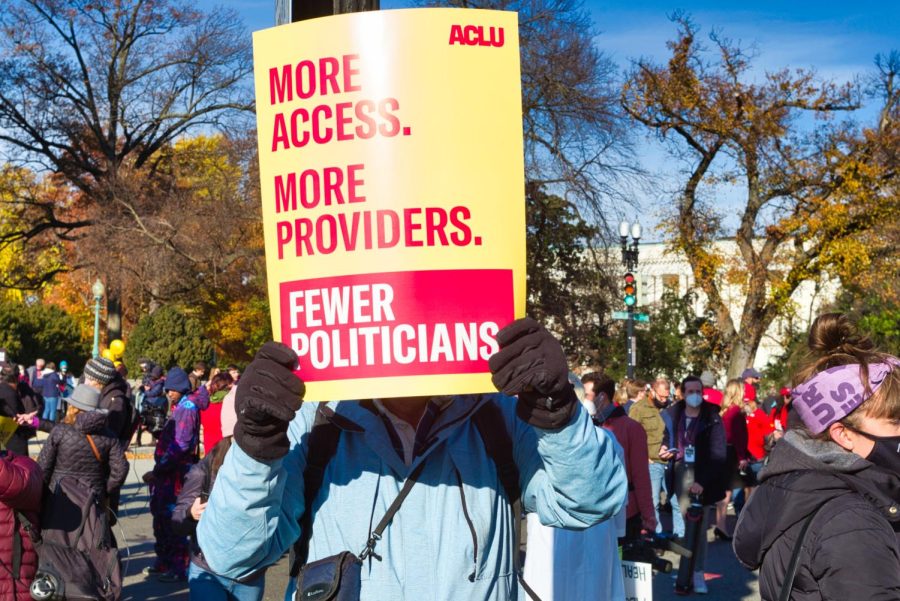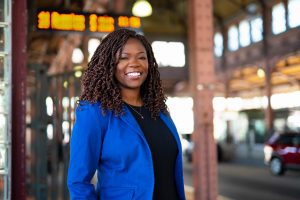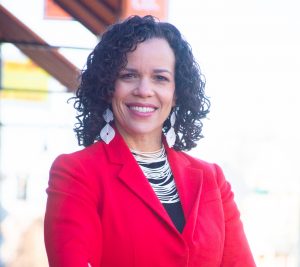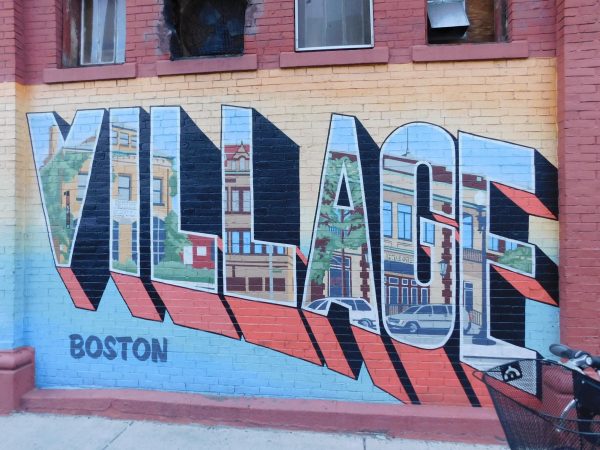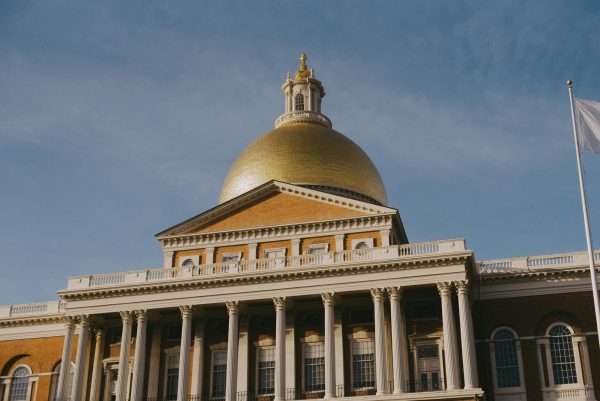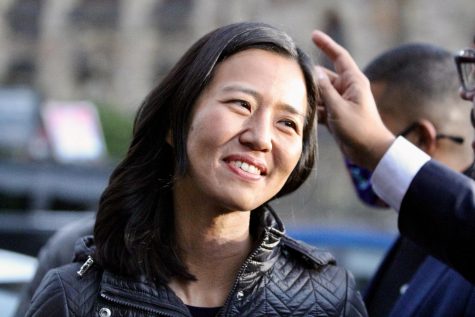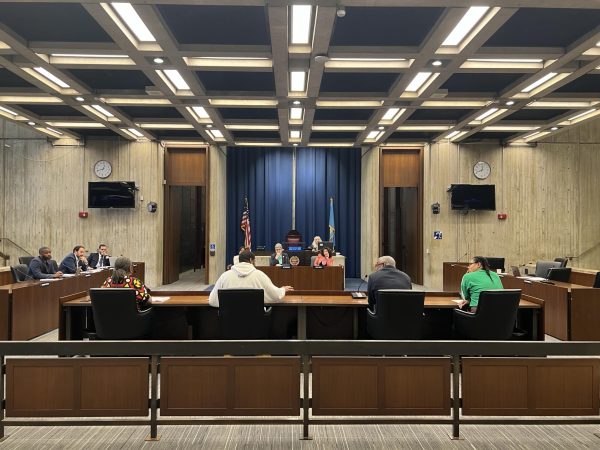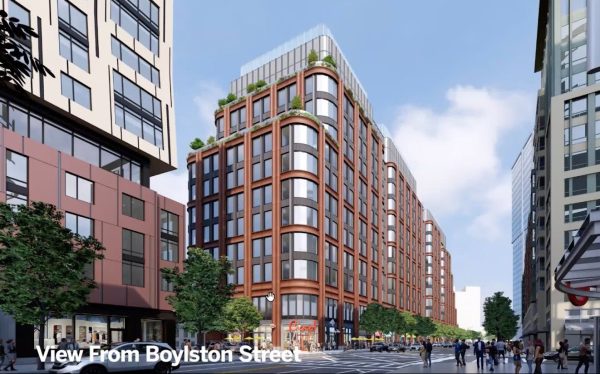Mississippi and Massachusetts: states connected by abortion rights
At Jackson Women’s Health Center in Mississippi, some of the rotating circuit of five doctors that serve the clinic come from Massachusetts, where abortion is protected by state law even if Roe v. Wade is overturned.
Photo: Brett Davis
“I am hearing from folks on the ground [in Mississippi] really heartbreaking stories about patients who are calling, to try to get information, to try to get an appointment,” Dr. Jennifer Childs-Roshak, president and CEO of the Planned Parenthood League of Massachusetts, said to a crowd protesting for abortion rights in Boston at Franklin Park Playstead. The crowd gathered in October in the wake of the Supreme Court announcing it would take up a case concerning a 2018 Mississippi abortion law.
“They’re traveling hundreds and hundreds of miles, flooding other states… and then impacting care there as well,” Childs-Roshak said. “This is also generating fear and concern among all the communities in Texas and beyond — in health centers, health providers, friends, and families.”
In one of those states hundreds of miles away, Shannon Brewer directs the only abortion clinic in Mississippi.
“Our patient load has almost doubled,” Brewer, director of Jackson Women’s Health Organization, said to The New York Times in November. “We are adjusting. We just know it’s got to be done.”
In preparation for the Supreme Court’s hearing on a case concerning abortion legislation in Mississippi, Dobbs v. Jackson Women’s Health Organization, the clinic has expanded its operating hours to five days a week from three. The clinic sees around 300 women per month.
Mississippi’s 2018 Gestational Age Act bans abortions after 15 weeks of pregnancy. If upheld by the Supreme Court, it will overturn Roe v. Wade and send “trigger laws” that prohibit all or nearly all abortion in 12 states into effect.
Back in Massachusetts, a professor at Northeastern University filed one brief of over 40 to the Supreme Court after the high court agreed to hear arguments around Mississippi’s legislation. Martha F. Davis, a professor of constitutional law and human rights advocacy, wrote the brief concerning the opening argument of Mississippi’s Gestational Age Act.
“Seventy-five percent of all nations do not permit abortion after twelve (12) weeks’ gestation,” the legislation states. Davis’s brief asserts that this argument “is neither relevant nor compelling.”
There are many links between Massachusetts and Mississippi concerning abortion. At Jackson Women’s Health Organization, some of the rotating circuit of five doctors that serve the clinic come from Massachusetts, where abortion is protected by state law even if Roe v. Wade is overturned.
In Massachusetts, patients can receive in-clinic abortions on the day of their first appointment for up to 21 weeks into pregnancy, and insurance can cover abortion procedures. Patients in Mississippi can only receive in-clinic abortions up to 16 weeks in pregnancy, must receive counseling 24 hours before an abortion procedure, minors must have parental consent and insurance can not cover abortions.
One Massachusetts doctor, Dr. Cheryl Hamlin, travels to Mississippi once a month. She conducts state-mandated counseling that Mississippi requires 24 hours before a patient can receive an abortion, performs abortions and sees more than a dozen patients a day within the clinic’s packed schedule.
“There are many laws restricting the care that we can provide here,” Dr. Hamlin said. “I’d encourage you all — if this is an issue important to you — to vote in any upcoming elections.”
No doctors at Jackson Women’s Health Organization live in Mississippi. The clinic maintains a house to accommodate out-of-state doctors. Brewer says “antis” will harass doctors that provide abortions in the state.
“Every local doctor we’ve ever had here, the antis are gonna harass them,” Brewer said. For doctors who also work at other healthcare providers, abortion opponents will “call their jobs all day. They’re going to their houses. They’re going to all their neighbors’ houses.”
“Antis” often protest outside of the Jackson clinic. Protestors hold pamphlets and signs along the clinic’s black fencing, meant to protect patients’ privacy. Others walk along the cars, trying to hand out snacks, while some protestors take down patients’ license plate numbers. It’s not unheard of for conflicts to break out involving the anti-abortion protestors outside the clinic. Security cameras are placed all along the clinic’s property, in addition to meetings with the local FBI to address threats on the clinic.
“I’m a very cautious person because of this place,” Brewer said. As the only abortion clinic in Mississippi, the pressure can be immense. Coupled with state laws that make it challenging to receive and provide abortions, Dobbs v. Jackson Women’s Health Organization presents the most significant hurdle yet. Still, advocates back in Massachusetts have spoken on the circumstances in Mississippi.
“Threatening and intimidating healthcare providers, nurses, doctors, threatening and intimidating friends and family and supporters is unacceptable, it’s immoral, and for patients, it’s devastating,” Dr. Childs-Roshak said.
Although Planned Parenthood does not have a location that provides abortions in Mississippi, four Planned Parenthood clinics in the neighboring state of Tennessee aim to serve Mississippi patients.
Last Wednesday, the Supreme Court heard arguments on Dobbs v. Jackson Women’s Health Organization. Davis’s brief was among them. Protestors also gathered outside the Supreme Court — many were advocating for abortion rights, as opposed to the protestors outside of the Jackson clinic. The difference from Mississippi to Washington, D.C., hundreds of miles away, shows the stark difference in opinion on abortion rights in the United States.
“You’re already a mama and daddy to the baby!” one anti-abortion demonstrator shouted outside of Jackson Women’s Health Center, reported The New York Times. “Let us help you! You’re paying someone to kill your baby!”
Last Wednesday in Washington, D.C., pro-abortion rights protestors shouted as well, with different goals in mind.
“We demand agency, autonomy, independence over our own bodies,” one sign held by pro-abortion protestors outside of the Supreme Court read. Around them, signs echoed “Abortion is healthcare” and “Protect abortion access,” side by side with signs that read “Stop abortion now,” and “Do you choose life?”
The “Pink House defenders” — volunteers that escort patients to and from the clinic — walk patients by similar protestors almost every day. Brewer described the protestors and defenders as a part of the battle in keeping the only remaining abortion clinic in Mississippi open.
“It shows what they can get accomplished over time by chipping away little by little,” Brewer said. “This is the big impact that they have been trying to get accomplished the whole time. They just do it little by little. And now they’ve gotten it down to one clinic.”
Former Mississippi Governor Phil Bryant, who signed the 2018 bill, tweeted on Mar. 18, 2018, “I am committed to making Mississippi the safest place in America for an unborn child, and this bill will help us achieve that goal.”
The Center for Mississippi Health Policy reported that Mississippi’s child mortality rate was 8.8 deaths per 1,000 live births in 2014 — the highest in the country. Earlier this year, Mississippi also failed to pass legislation that would extend postpartum Medicaid coverage. While Bryant claimed to work to make Mississippi “the safest place in America” for children, the reality lags behind.
“One thing I’ve learned is that our government of Mississippi don’t seem to care about children,” Brewer said. Along with abortions, Jackson Women’s Health Organization provides several forms of birth control to patients, including the pill, depo shots, and low-cost IUDs. If the clinic closes its doors following an overturn of Roe v. Wade, many patients may find themselves without a local birth control provider. Appointments at the nearby Hinds County Health Department can take six months to schedule, estimates Brewer.
“When someone seeks an abortion and is denied care, their lives are changed forever,” Dr. Childs-Roshak said.
As the Supreme Court prepares to rule on Dobbs v. Jackson Women’s Health Organization, Brewer and the rest of the clinic continue to provide patients with abortions.
“Pro-choice do not mean that you will have an abortion,” Brewer said. “Pro-choice do not mean that. It just means that you have no say-so of what the next person does with their body. That’s all pro-choice means.”
Editor’s note: The featured image was taken by Brett Davis outside the Supreme Court during the debate of the Mississippi abortion case the week of Nov. 30.

